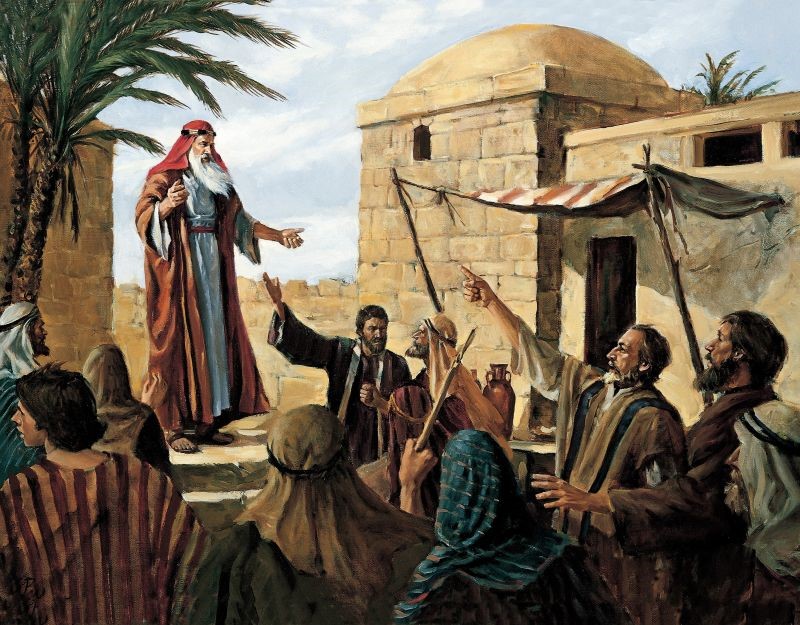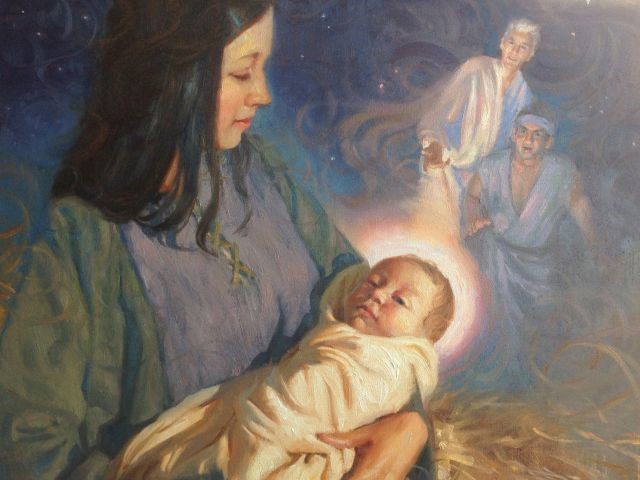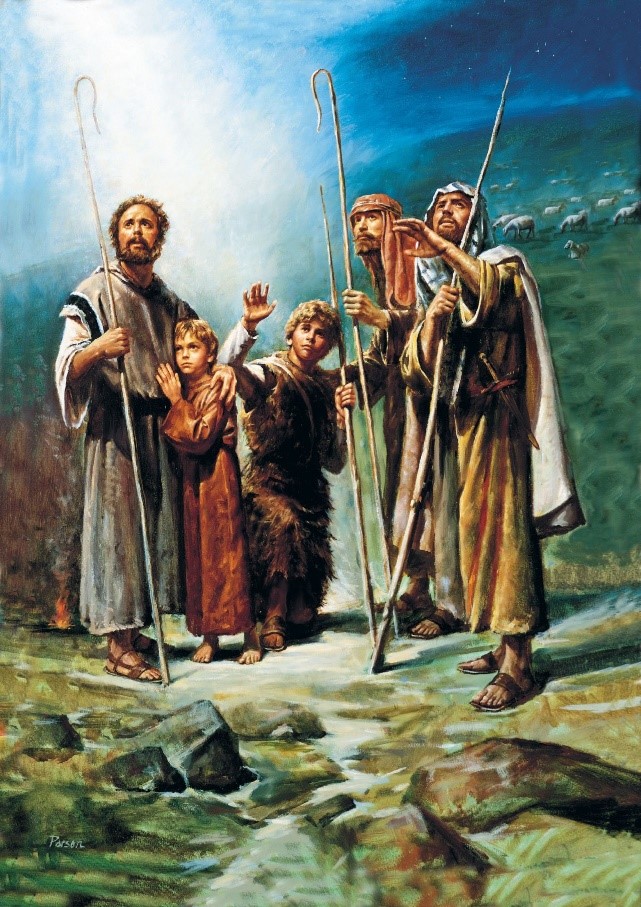Christmas Message, Christmas Prophets, Christmas Joy
by David W. Smith
Jerusalem, 600 BC
The year is approximately 600 BC. The place is Jerusalem. It has been about 20 years since a major religious reform has changed how people worshiped. The prophet Jeremiah has been warning the people of Jerusalem that they need to repent or else watch as their city is destroyed and they are taken into captivity. Many other prophets echo his message. Now, after preaching for over 20 years, he is in prison.
In this tumultuous time, a man sees an amazing vision. He sees a great person come down out of heaven, shining more brightly than the sun. He sees twelve others follow him, shining brighter than the stars. The great person comes to him, gives him a book, and asks him to read. He then goes out to share with the people of Jerusalem what he saw and heard. He joins the other prophets in warning the people of their coming doom. He adds a message of hope: because of what he saw and read, he knows that a Messiah will come and redeem the world.

The people of Jerusalem are so upset at this message that they try to kill him. But through the Lord’s mercies, he escapes into the wilderness with his family.[1]
Visions in the Wilderness
While in the wilderness, he shares more with his family about this great message of joy. He shares a vision he had about a tree with fruit that “was desirable to make one happy.” He ate this fruit and was filled “with exceedingly great joy” (1 Nephi 8:10, 12). After sharing this dream, he teaches more about the Messiah who will come. He says that in 600 years this Messiah will come among the Jews and be the Savior of the world. “He also spake concerning the prophets, how a great number had testified of these things, concerning this Messiah, of whom he had spoken, or this Redeemer of the world. Wherefore, all mankind were in a lost and in a fallen state, and ever would be save they should rely on this Redeemer” (1 Nephi 10:4). He teaches that this Messiah will be slain by the Jews and then will rise again.
One of this man’s sons wants to know more, so the son diligently seeks for revelation from God. The Lord blesses the son with a vision, guided by an angel. In this vision he sees the tree his father saw and the fruit his father ate. He also sees his old home, Jerusalem. He sees other cities, including Nazareth, a city north of Jerusalem. “In the city of Nazareth I beheld a virgin, and she was exceedingly fair and white. . . . And I looked and beheld the virgin again, bearing a child in her arms. And the angel said unto me: Behold the Lamb of God, yea, even the Son of the Eternal Father” (1 Nephi 11:13, 20–21).
At this point—as this young man is seeing this special child in the arms of his mother—the angel asks, “Knowest thou the meaning of the tree which thy father saw?” The young man responds, “Yea, it is the love of God, which sheddeth itself abroad in the hearts of the children of men; wherefore, it is the most desirable above all things. And [the angel] spake unto me, saying: Yea, and the most joyous to the soul” (1 Nephi 11:22–23).

The young man then sees this child become a man who goes about ministering and healing, with twelve others following him. The young man sees the man taken, judged, and slain for the sins of the world. After that, he sees people fighting against the twelve who were with the Messiah. He sees these people fall, and the angel warns: “Thus shall be the destruction of all nations, kindreds, tongues, and people, that shall fight against the twelve apostles of the Lamb” (1 Nephi 11:34–36).
Glad Tidings of Great Joy
This young man and his family continued their journey in the wilderness. Eventually they came to the seashore, built a boat, and sailed across the sea to a new land. And the young man continued to teach the message of the Messiah using scripture and his own visions. He “did read unto [his people] that which was written by the prophet Isaiah” in order to “more fully persuade them to believe in the Lord their Redeemer.” He did this “that ye may have hope as well as your brethren from whom ye have been broken off” (1 Nephi 19:23–24). One of Isaiah’s prophesies was of the joy to come through the publishing of this message: “How beautiful upon the mountains are the feet of him that bringeth good tidings, that publisheth peace; that bringeth good tidings of good, that publisheth salvation” (Isaiah 52:7).
Centuries after this young man, another prophet heard these good tidings from an angel and was told to share these tidings with the people. Said the angel:
Behold, I am come to declare unto you the glad tidings of great joy. For the Lord . . . hath sent me to declare unto thee that thou mayest rejoice; and that thou mayest declare unto thy people, that they may also be filled with joy. For behold, the time cometh, and is not far distant, that with power, the Lord Omnipotent who reigneth . . . shall come down from heaven among the children of men . . . And he shall be called Jesus Christ, the Son of God, the Father of heaven and earth, the Creator of all things from the beginning; and his mother shall be called Mary. And lo, he cometh unto his own, that salvation might come unto the children of men even through faith on his name. (Mosiah 3:3–9)
The birth of Jesus Christ fulfilled this prophecy. The night Jesus was born, there were shepherds “keeping watch over their flock over their flock by night. And, lo, the angel of the Lord came upon them . . . And the angel said unto them, Fear not: for, behold, I bring you good tidings of great joy, which shall be to all people. For unto you is born this day in the city of David a Saviour, which is Christ the Lord” (Luke 2:8–11).

This was the message of the prophets from the beginning. Starting with Adam and Eve, “Old Testament patriarchs, prophets, poets, and people looked forward to better days, filled with hope for renewal and deliverance by the Messiah. . . . Through it all, prophets reminded them that a Messiah, a Deliverer would come ‘to proclaim liberty to the captives’ (Isaiah 61:1).”[2] As Isaiah prophesied, this Messiah would “comfort all that mourn; to appoint unto them that mourn in Zion, to give unto them beauty for ashes, the oil of joy for mourning” (Isaiah 61:2–3).
The Horn of Salvation
Others also prophesied of the Messiah. While speaking of Zion, the Psalmist prophesied, “Her saints shall shout aloud for joy. There will I make the horn of David to bud: I have ordained a lamp for mine anointed” (Psalm 132:16–17). The birth of Jesus Christ fulfilled this prophecy. Zacharias, a priest in Jerusalem, announced just before the Savior’s birth: “Blessed be the Lord God of Israel; for he hath visited and redeemed his people, and hath raised up an horn of salvation for us in the house of his servant David; as he spake by the mouth of his holy prophets, which have been since the world began” (Luke 1:68–70; cf. 71–79). Simeon, a holy man in Jerusalem, saw the child Jesus and declared, “Mine eyes have seen thy salvation, which thou hast prepared before the face of all people” (Luke 2:30–31; cf. 25–33). Anna, a prophetess, came to where Simeon was and “gave thanks likewise unto the Lord, and spake of him to all them that looked for redemption in Jerusalem” (Luke 2:38; cf. 36–38).
These prophecies and others let people know of redemption through the Messiah. This message was shared by prophets, and joy came to those who listened to their message. After one prophet testified of this message, someone who heard “had infused such joy into his soul” that he was overcome and became unconscious. When he regained consciousness, he stood and declared, “Blessed be the name of God . . . [for] behold, I have seen my Redeemer; and he shall come forth, and be born of a woman, and he shall redeem all mankind who believe on his name” (Alma 19:6, 12–13).
Another person was so wicked that an angel came to him to call him to repentance. After being overcome and being unconscious for days, he said, “I remembered also to have heard my father prophesy unto the people concerning the coming of one Jesus Christ, a Son of God, to atone for the sins of the world. Now, as my mind caught hold upon this thought, I cried within my heart: O Jesus, thou Son of God, have mercy on me . . . And oh, what joy, and what marvelous light I did behold” (Alma 36:17–20). This person then went on to share these glad tidings.
The Testimony of Apostles
At this Christmas season, and as we conclude our study of the Old Testament for this year’s Come, Follow Me curriculum, let us reflect on the message of the Old Testament: that God will deliver His people through His Messiah, born of Mary, and that God “declared unto prophets, by his own mouth, that Christ should come.” They received this message “that they may bear testimony of him. And by so doing, the Lord God prepareth the way that [all people] may have faith in Christ” and be saved (Moroni 7:23–34). The Christmas message (which is the glad tidings) came from Christmas prophets to help people have Christmas joy.
The Prophet Joseph Smith explained, “The fundamental principles of our religion are the testimony of the Apostles and Prophets, concerning Jesus Christ.”[3] Paul taught that the Saints “are built upon the foundation of the apostles and prophets, [with] Jesus Christ himself being the chief corner stone” (Ephesians 2:20), as Isaiah prophesied: “Behold, I lay in Sion a chief corner stone, elect, precious: and he that believeth on him shall not be confounded” (1 Peter 2:6, quoting Isaiah 28:16).

Let us listen to the words of the prophets and receive the glad tidings of great joy. We will then be the fulfillment of Isaiah’s prophecy: “It shall be said in that day, Lo, this is our God; we have waited for him, and he will save us: this is the Lord; we have waited for him, we will be glad and rejoice in his salvation” (Isaiah 25:9).
Returning to our introductory story, the young man saw the Messiah’s birth and understood the joy that comes through the salvation He offers. The twelve apostles who were with the Messiah brought that message to the world. All who embrace their message embrace joy both now and after this life, having everlasting salvation, as proclaimed by God’s living Apostles:
“Jesus Christ has once again called Apostles and has given them priesthood authority. He invites all of us to come unto Him and His Church, to receive the Holy Ghost, the ordinances of salvation, and to gain enduring joy.”[4]
“We bear testimony, as His duly ordained Apostles—that Jesus is the Living Christ, the immortal Son of God. He is the great King Immanuel, who stands today on the right hand of His Father. He is the light, the life, and the hope of the world. His way is the path that leads to happiness in this life and eternal life in the world to come. God be thanked for the matchless gift of His divine Son.”[5]
More Come, Follow Me resources here.
[1] See 1 Nephi chapters 1 and 2.
[2] “December 19–25: Christmas: ‘We Have Waited for Him, and He Will Save Us,’” in Come, Follow Me—For Individuals and Families: Old Testament 2022.
[3] “Chapter 3: Jesus Christ, the Divine Redeemer of the World,” Teachings of Presidents of the Church: Joseph Smith.
[4] “The Restoration of the Fulness of the Gospel of Jesus Christ: A Bicentennial Proclamation to the World,” Gospel Library.
[5] “The Living Christ: The Testimony of the Apostles,” Gospel Library.
 David W. Smith has volunteered with FAIR since August 2019. He has had an article published in BYU Studies, and he presented at the Joseph Smith Papers Conference in 2019. He has a bachelor’s degree in philosophy and a master’s degree in public administration, both from Brigham Young University.
David W. Smith has volunteered with FAIR since August 2019. He has had an article published in BYU Studies, and he presented at the Joseph Smith Papers Conference in 2019. He has a bachelor’s degree in philosophy and a master’s degree in public administration, both from Brigham Young University.
The post Come, Follow Me Week 52 – Christmas appeared first on FAIR.
Continue reading at the original source →



